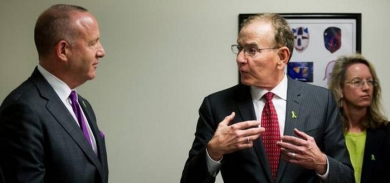
Alumni keep LA County Department of Mental Health Humming UCLA Luskin alumni have a growing influence on social welfare in Los Angeles
By Alejandra Reyes-Velarde
UCLA Luskin Student Writer
Over the years, Social Welfare alumni have stepped into managerial positions in various programs in the Los Angeles County Department of Mental Health. From overseeing supervisors and clinicians to working directly with children, adolescent and adult patients with mental health problems, alumni have elevated the practice of social work beyond what can be done on the street.
After graduating from UCLA, Silvia Rowe MSW ‘95 obtained a position with Didi Hersh working with clients in outpatient treatment. Rowe then transferred to the Department of Mental Health, where she has been working as program head of the San Antonio Mental Health Center for 15 years.
“I knew I wanted to go into mental health, but I didn’t know I wanted to go into administration,” she said. “I wasn’t a macro person. That evolved as I learned what the different roles within mental health were.”
Rowe said that when she received the position in the child adolescent program in Long Beach, she first began to consider herself in a managerial role because she was seen as a lead clinician by other staff.
Repeatedly, social welfare alumni, including Department of Mental Health director Marvin Southard DSW ‘83, have been recognized for their outstanding work and referred to higher administrative positions through networks with colleagues.
Much like Rowe, Southard graduated and took summer jobs and internships, working as a forensic specialist in a community agency after his first year in UCLA’s DSW program., Southard said he was able to obtain a position as a clinical director because of the research and writing experience he obtained at UCLA.
Southard said the relationships he formed, both with professors and classmates, have supported him through the years.
“(My education at UCLA) has helped me in several ways,” Southard said. “My clinical professor and two policy professors remain advisors to me through the years and in the various positions I have had. I consider both my classmates and professors an important part of my evolution as a leader through the years.”
For many alumni, obtaining managerial positions has been a serendipitous experience, allowing them to enjoy multiple elements of social work. Though Rowe decided that long term therapy was not what she wanted to do, she said she enjoys that she is still able to work with clients directly. For her, being program head allows all her interests to come together. She said enjoys the managerial side of social work because it’s a different side of mental health that is necessary to provide people with services and training clinicians to make sure clients are getting what they need.
“I actually enjoy (working with clients) very much. I enjoy seeing the changes and the direct contact. It gives me a bit of both worlds,” she said.
Rowe has fond memories as a program head as well as a clinician. She remembers in particular working with a young Salvadoran adolescent woman who suffered many hardships on her journey to the U.S., causing her to enter into depression.
“In the process of building a relationship with her, she was able to open up and tell me what happened. It was satisfying to see that this person left a more confident young woman who felt she could manage anything.”
In a similar position as Rowe, James Coomes MSW ‘96 serves people who experience chronic and severe mental health problems as the program manager of Olive View Community Mental Health Urgent Care Center.
Coomes believed he would pursue child welfare and did his masters thesis on adoptions, but started transitioning after trying different fields when he graduated from UCLA.
“I thought I was going to be an adoptions worker my entire career and I thought I’d be perfectly happy. But getting out of school and becoming exposed to the work force and the opportunities that were out there, I tried to invest myself wherever I was.”
Coomes said his role has been rewarding because he has been able to see changes in the department and people getting quicker access to the services they need. Coomes said that in a managerial position, he has been able to train and supervise staff, making sure they know how to best navigate the program.
“I’m having a lot of fun with working on everything from direct client services to administrative processes and certification. It’s a challenge, but it’s invigorating. It gets me going everyday and I feel like I’ve had a real opportunity to make an impact on people’s lives.”
Southard said he knows Coomes to be a strong Bruin, being actively involved in the athletics program.
“As a leader he’s a clear, articulate, charismatic guy that can represent both UCLA and the profession of social work very well,” Southard said.
Southard said he thinks UCLA alumni have been pivotal to the mental health department and have served as the backbone for their community-based workforce. He sees the benefit of his Bruin education over the course of his career.
“I’m grateful for my time at UCLA. It has been one of the pivotal things that have allowed me to achieve the things I’ve been able to achieve,” Southard said.


Leave a Reply
Want to join the discussion?Feel free to contribute!